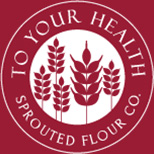Q & A by Peggy Sutton, Founder and President
How long have you been in business and how did you get interested in
sprouted grains?
To Your Health Sprouted Flour Co. celebrated its 8th anniversary in September of 2014. I started out baking organic sprouted breads, crackers, muffins, and granola for friends and family in my kitchen and today my business is housed in a 14,400 square feet building with 30 employees. We’re producing 70,000 lbs. of organic sprouted grains and flour a week. For a business that I didn’t intentionally try to make happen, it continues to grow and I’m still excited about providing healthy, nutritious, digestible grains to those wanting to eat healthy.
What started as a personal quest to try to discover the truth in nutrition led to my discovery of the goodness of sprouting grains for great taste, digestibility and nutrition. I fell in love with sprouting and the baked goods I made from sprouted grains were fabulous. The distinct tastes of the different grains were enhanced and for the first time in my life I could eat bread without it going to my hips or giving me that water retention feeling.
What makes sprouted flour better for us?
There are several benefits of sprouted grains and flours, all of which are an important part of eating a healthy diet.
When grains are sprouted they are converted into a living food with more vital nutrients which are more readily absorbed by the body. Complex sugars (starch) are broken down and as a result, painful intestinal gases and potent carcinogens and enzyme inhibitors are neutralized (digests like a tomato, not a potato). This is especially beneficial for folks with sensitivities to wheat as they often discover that they can digest sprouted grains without any problem (organicwheatproducts.com).
Sprouting also increases B vitamins in the grain, especially B1, 2, 3, and 5. Biotin, folic acid and vitamin C also increase. I have to say at this point that sprouting increases vitamins that are present in the grain. In other words, if I have organic raw grain that doesn’t contain any vitamin C, then sprouting isn’t going to create any. Unfortunately, organic today means that your food doesn’t have any chemicals or pesticides in it and is non-GMO, but it does not necessarily mean that it is more nutritious in other ways for you.
Sprouting also aids in the absorption of calcium, magnesium, iron, copper and zinc (Price-Pottenger Nutrition Foundation). Other resources for the benefits of sprouted grains include Nourishing Traditions by Sally Fallon and The Wheat Council.
And… as any baker or chef will tell you, it’s all about how good food tastes that counts first. If your food doesn’t taste good, it doesn’t matter much how good it is for you. Most likely you’re not going to eat it very often if at all.
Sprouting versus Soaking?
As explained above, sprouting does so much more for grains and flours than just soaking them. While soaking can aid in the breakdown of phytates in the grains which aids digestion, it does not change the seed from its dormant state into a living food (plant). Soaking can certainly make grains more digestible by eliminating the seeds’ natural barriers, but it doesn’t break down the grains’ starches or increase the nutrients in the grains. Your pancreas is still going to do most of the digestive work if you’re eating soaked breads versus sprouted breads. If you’re in a hurry to make bread or cook oatmeal sprouted grains and flours allow you to skip the soaking and get to the baking, so it’s a real time saver.
What do you think of the latest hubbub over the dangers of wheat and other grains, and how it’s gotten so hybridized that it’s only a very small step away from being GMO?
I read Wheat Belly by Dr. William Davis. I have to agree with the author that wheat has definitely been hybridized over the years. I would think that genetic modification may be just around the corner, but I certainly hope not. While Dr. Davis expounds on the “dangers” of wheat in his book, he indirectly gives testimony to the state of most of our foods today – most of them have been hybridized or genetically altered in some way. Think about it; there are hundreds of varieties of tomatoes. Seems like every year there are new lettuce mixes coming out. My organic seed catalog is always introducing new breeds of vegetables available for my spring and winter gardens. Wheat is simply one of many seeds that has been altered to grow in today’s compromised soil climates.
Wheat could be dangerous, or at least uncomfortable, to a compromised immune system and ailing intestinal tract. But it wouldn’t be the only bad apple in the barrel.
Do you agree that there are some who do best without grains in their diets?
I believe that God made us all a little different on the inside, just like the outside. That’s why some folks seem to be able to eat whatever they want (I’m referring to healthy foods) without any adverse reactions, and some folks find it hard to eat more than a few items without some unpleasant physical or mental effect.
We as a nation are finding it difficult to step back from our “grain fed” lifestyles. And I will agree that all processed grain products need to be eliminated from our diets. But I believe that properly prepared grains have an important place in a well-balanced diet.
The GAPS Diet seems to be very popular with lots of WAPF folks to help them detox, regain health, and discover what’s been plaguing them and causing their chronic symptoms. For people needing to heal I can understand that grains as well as other food categories have to be eliminated from the diet for a time. I don’t believe that any diet that eliminates complete food groups should be adhered to for a lifetime. That’s not God’s plan for us and I don’t believe it is a healthy way to eat long term. However, having said that, I understand that there are rare cases where someone simply will never be able to tolerate certain foods and enjoy good health.
Do you agree that while most people can eat properly prepared grains with no problems that it should not be a huge part of their diet that the USDA suggests in their food guidelines?
Yes, I agree that grains have a proper place in our diets, but not a prominent place. I’m personally a pork fat and butter eating gal. Bread is a great vehicle for lots of butter, just like coffee is a great vehicle for super thick raw cream. And if it isn’t cooked with pork fat (or butter works, too), there aren’t too many vegetables to be had on my plate. Breads and baked goods are great occasional meal accompaniments. Some foods are just plain better with them than without.
What are your best selling products?
Our sprouted red and white wheat flours are by far the most popular products we sell, followed by our sprouted rolled oats, spelt, rice, and corn flours. Our sprouted grains are popular, too, especially for those with home mills or who enjoy sprouted cooked grains as cereals and side dishes.
Peggy Sutton, President and Founder
To Your Health Sprouted Flour Co.
1138 Highway 82, Fitzpatrick, Alabama 36029
(334) 584-7875
(334) 584-7078 Fax
info@healthyflour.com
www.healthyflour.com

 334-584-7875
334-584-7875

